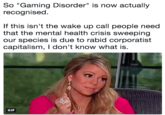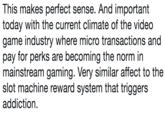Overview
WHO "Gaming Disorder" Recognition refers to the proposed classification of addictive behavior towards video gaming as a mental health disorder by the World Health Organization, leading to debate among medical professionals as to whether "Gaming Disorder" qualifies as a mental health disorder.
Background
Debate on whether or not "Gaming Disorder" was a real condition worthy of a label in the International Classification of Diseases has raged for several years. "Gaming Disorder" was listed in 2013’s Diagnostic and Statistical Manual as a "condition for further study."[4] Dr. Craig Ferguson has been a vocal critic of the classification. In 2016, he wrote an academic paper opposing the classification.[5] In January of 2015, Vice[6] ran a piece illustrating how gaming addiction can ruin lives.
Developments
On December 21st, the World Health Organization released a beta draft of its forthcoming 11th International Classification of Diseases. In the draft, it added "Gaming Disorder" in its section on "Mental, behavioural or neurodevelopmental disorders."[1] The description of Gaming Disorder reads:
Gaming disorder is characterized by a pattern of persistent or recurrent gaming behaviour (‘digital gaming’ or ‘video-gaming’), which may be online (i.e., over the internet) or offline, manifested by: 1) impaired control over gaming (e.g., onset, frequency, intensity, duration, termination, context); 2) increasing priority given to gaming to the extent that gaming takes precedence over other life interests and daily activities; and 3) continuation or escalation of gaming despite the occurrence of negative consequences. The behaviour pattern is of sufficient severity to result in significant impairment in personal, family, social, educational, occupational or other important areas of functioning. The pattern of gaming behaviour may be continuous or episodic and recurrent. The gaming behaviour and other features are normally evident over a period of at least 12 months in order for a diagnosis to be assigned, although the required duration may be shortened if all diagnostic requirements are met and symptoms are severe.
Once the draft was posted, news organizations including CNN,[2] Forbes,[3] and Kotaku[4] covered the news. Kotaku spoke with several medical professionals and psychologists who disagreed with the classification. Dr. Chris Ferguson wrote:
"I have considerable concerns about this proposed diagnosis… There are many myths such as that games involve dopamine and brain regions similar to substance abuse. There’s a kernel of truth to that but only insofar as any pleasurable activity activates these regions. How gaming involves them is more similar to other fun activities like eating chocolate, having sex, getting a good grade, etc., not heroin or cocaine.”
University of Oxford psychologist Andrew Przybylski wrote that the classification could potentially overshadow problems like depression and anxiety which contribute to addictive gaming.
Following the release of the news, several threads were posted to Reddit about the proposal, including in /r/news,[7] /r/games,[8] and /r/gaming.[9] There, users responded to news dismissively, considering the term on par with something like Reddit Addiction. On December 26th, YouTuber MundaneMatt released a video discussing the news, gaining over 12,000 views (shown below).
Classification
On June 18th, 2018, the World Health Organization officially classified that gaming disorder as a mental health condition. They defined the condition as "a pattern of persistent or recurrent gaming behavior ('digital gaming' or 'video-gaming'), which may be online (i.e., over the Internet) or offline."[10] This designation could allow insurance companies to cover patients looking for treatment with gaming addiction.
Online, people reacted positively to the classification, with many believing that it was an overdue classification. Twitter[11] user @brandt_brickell tweeted, "This makes perfect sense. And important today with the current climate of the video game industry where micro transactions and pay for perks are becoming the norm in mainstream gaming. Very similar affect to the slot machine reward system that triggers addiction." The post (shown below, left) received more than 125 retweets and 445 likes in 24 hours.
Twitter[12] user @MrTopple wrote, "So 'Gaming Disorder' is now actually recognised. If this isn't the wake up call people need that the mental health crisis sweeping our species is due to rabid corporatist capitalism, I don't know what is." The post (shown below, center) received more than 150 retweets and 600 likes.
Twitter[13] user @JamaicanSlayage tweeted, "Controversial but overdue. Likely to be the new ADHD – heavily misdiagnosed, stigmatized and weaponized by frustrated parents & older folk. But in a world being overtaken by AI, this is a baby step in the right direction for research in our field." The post (shown below, right) received more than 65 retweets and 250 likes in 24 hours.



Search Interest
External References
[1] World Health Organization – Classification of Diseases 6D11
[2] CNN – WHO to recognize gaming disorder as mental health condition in 2018
[3] Forbes – Do You Have 'Gaming Disorder,' A Newly Recognized Mental Health Condition?
[4] Kotaku – Experts Have A New Reason To Debate Whether ‘Gaming Disorder’ Is Real
[5] Akademiai – Scholars’ open debate paper on the World Health Organization ICD-11 Gaming Disorder proposal
[6] Vice – How Video Game Addiction Can Destroy Your Life
[7] Reddit – Gaming disorder is going to be named a mental health condition for the first time
[9] Reddit – Gaming disorder to be named a mental health condition for the first time.
[10] CGTN – Video game addicts are mentally ill, says WHO
[11] Twitter – @brandt_brickell's Tweet
[12] Twitter – @MrTopple's Tweet
[13] Twitter – @JamaicanSlayage's Tweet




